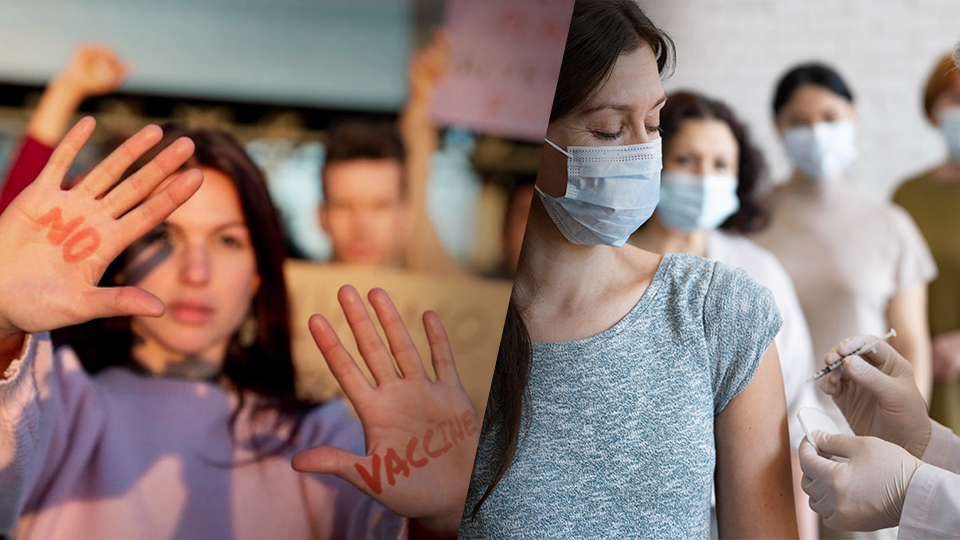Convincing the population in different countries to get vaccinated against COVID is the biggest communication and marketing challenge that humanity has ever faced but it has a very short creative brief: to build trust between the population and those in power (whether political or scientific). The biggest difference between those who get vaccinated and those who refuse to is not how intelligent, good-natured, or educated they are, but how much they trust the intentions of the people in authority around them, be they scientists, doctors, journalists, or others in power. The difference between trusting and not is like the difference between making your way through a pitch-black cave with and without a torch. Trusting helps us alleviate our fear of uncertainty.
Instead of looking down on anti-vaxxers with a superior eye, which leads to more polarisation in a world of already deeply polarised societies, what the designers of vaccine campaigns should do is show more curiosity and openness towards those who are hesitant or reject the vaccines and seek to understand what has led them to be so mistrustful. Once the barriers have been identified, the answers about how to engage with them more effectively and how to build the trust that will convince people to get vaccinated, will emerge.
Global institutions have captured many insights and learnings about interventions that work. A key insight that behavioural science (an intersection between psychology, neuroscience and economics) teaches us is the need to appeal to people’s emotions, not just to their rational thinking, because ultimately, it is our emotions that drive our decisions much more than our rational thinking.
Choosing the right messengers is also key because the messenger is much more important than the message in building trust. Doctors, nurses, teachers, religious or community leaders and celebrities make particularly powerful messengers.
Various ways of persuading more mistrustful communities have been tried in the UK, including direct engagement via mobile phone calls and a high-profile advertising campaign fronted by well-known influencers and celebrities from these communities. In addition, some practical barriers to vaccination have been removed in campaigns worldwide in an attempt to deal with possible procrastination. These have included free transportation to vaccine centres or opening pop-up centres near people’s homes to provide them with easier access to vaccines. In some countries incentives such as introducing lotteries for vaccinated people or organising large block parties that include a vaccination station, have shown some promise.
According to behavioural science, all people display something called confirmation bias. This means that we look for and believe evidence that supports our existing view of the world. The messengers we trust have the highest chance of breaking through this confirmation bias. So choosing the right messenger for vaccine hesitant or vaccine-rejecting groups, someone whom they already trust, is the most important thing in changing people’s minds on vaccination. Nothing you or I tell them will matter if they do not trust us in the first place. By contrast, giving a platform to people who are like them - for example people who have previously been hesitant or outright rejecting of vaccines but have taken the leap - would be much more effective. Activating doctors and nurses, who are among the most trusted professionals, to convince this group of the merits of getting vaccinated would also be effective.
If I have learned one thing from my own family’s experience in the pandemic (which I shared in a previous blog), it is that we should not try to convince someone who categorically rejects the vaccine that their view is flawed. From a marketing and a behavioural science perspective, the best thing to do is to target the hesitant but persuadable group first and once they have been vaccinated, approach the rejectors through the power of the behaviours of “others”. According to the theory of social validation, we are all more likely to engage in a behaviour if more people around us engage in that behaviour too.
It is impossible to make a reliable prediction of when the pandemic will be over because we are dealing with two unknown variables: the rate of vaccination of a large enough proportion of the world population to suppress the spread of coronavirus, and how aggressively and successfully the virus proliferates and mutates into new variants. Among other things, the end of the pandemic relies on our collective competence, humanity, solidarity, and marketing ingenuity. The success of the vaccination campaigns globally is pivotal in outpacing the virus and eventually winning the race. We must throw everything we’ve got at it!






